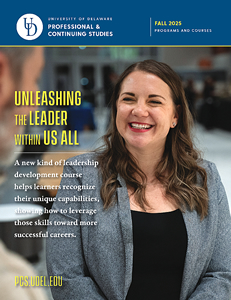The intersection of AI, data and decision making
This course is closed.
- Equip yourself with the skills to turn data into actionable insights for strategic decision-making in global markets.
- Learn to use the latest tools, including generative AI, and apply them to real-world scenarios.
- Gain a strong foundation in ethical practices, ensuring your competitive intelligence activities adhere to legal and moral standards.
- Earn digital badges for each completed course and a digital certificate upon finishing all three courses to enhance your career opportunities.
- Discounts, payment plan, scholarships available
The Competitive Intelligence and Analytics (CIA) noncredit certificate program is offered through a partnership between the Division of Professional and Continuing Studies (PCS) and the Alfred Lerner College of Business and Economics. This program aims to equip professionals with the skills needed to transform data into actionable insights for strategic decision-making in global markets.
In today’s rapidly evolving industries, marked by technological advancements and geopolitical changes, competitive intelligence is crucial for organizations to navigate these challenges effectively. The program emphasizes ethical practices, employs cutting-edge tools — including generative AI — and incorporates real-world applications to prepare participants for careers in competitive intelligence, strategic planning, market analysis and innovation management.
The professional noncredit certificate in Competitive Intelligence and Analytics is ideal for individuals looking to develop and enhance their strategic analytical skills, as well as gain insights into competitive markets and technology. This certificate consists of three stackable courses, which allows students to earn digital badges for each course completed. Upon finishing all three courses, participants will receive a digital certificate of completion in Competitive Intelligence and Analytics.
The program is designed for flexibility and accessibility, enabling participants to tailor their learning experience to meet their professional development needs. The curriculum balances theory and practice, with courses available to be taken individually in any order or combined into a comprehensive certificate.
REGISTRATION AND SCHEDULE
Competitive Intelligence and Analytics – Noncredit Certificate
PRICE: Course 1: $1,990; Course 2: $1,990
|
PROGRAM DETAILS
Who should participate in this program?
- Professionals in CI, strategic planning, market research, research and development or business development.
- Career changers seeking roles in competitive intelligence, consulting or innovation management.
- Entrepreneurs and subject matter experts who want to enhance their market positioning.
Learning outcomes for the certificate program
In this three-course certificate program, participants will:
- Master the CI cycle (planning, collection, analysis, dissemination) in global contexts.
- Apply analytical frameworks like PESTEL, Scenarios, War game and LIST to gain strategic insights into industries and competitors.
- Leverage AI tools (e.g., ChatGPT, Copilot, Gemini, patent analytics software) ethically for data collection and visualization.
- Design actionable intelligence reports for executive decision-making.
- Navigate legal, cultural and ethical challenges in global CI operations.
Instructors
Qingjiu (Tom) Tao is a distinguished professor at the University of Delaware Lerner School of Business and Economics, where he teaches courses in strategic management and competitive intelligence. He earned his doctorate in strategic management and international business from the University of Pittsburgh in 2004. From 2003 to 2009, Tao served on the editorial board of the Journal of Competitive Intelligence and Management (JCIM) and was honored as a CI Fellow by the Council of Competitive Intelligence Fellows in 2018.
Tao's research, which focuses on alliance portfolios and competitive intelligence, has been published in prestigious journals such as the Strategic Management Journal and Competitive Intelligence Review. He has delivered lectures at renowned institutions including the University of Pennsylvania Wharton School, Dartmouth College, the University of Tokyo, the University of Michigan and AutoUni—Volkswagen. He has also provided expert testimony before the U.S.-China Economic and Security Review Commission regarding China's auto industry.
Craig S. Fleisher is a world-renowned scholar, practitioner, advisor and author who has written or edited numerous foundational books on business, including competitive market intelligence and analysis. A winner of the Strategic Consortium of Intelligence Professionals’ foremost award (Meritorious Award), business school dean and MBA director, chief analytics officer for Aurora WDC, association president, university research chair and competitive intelligence fellow, Fleisher is known as the “Dean of Competitive Analytics.” He has been teaching executive courses and workshops on applied intelligence for four decades and has led learning events and workshops for many of the world's leading brands. Read more about Fleisher on his Amazon author’s page, LinkedIn and Google Scholar.
Courses
Course 1: Foundations of Competitive Intelligence (CI)
Learning outcomes
- Understand core concepts: Familiarize yourself with the core concepts of the competitive intelligence (CI) cycle, including data, information, intelligence and the CI profession.
- Perform tasking and planning: Identify key intelligence topics and questions, as well as project management strategies.
- Implement collection: Demonstrate effective acquisition of primary and secondary sources to support global intelligence efforts.
- Conduct analysis: Understand and apply competitive and industry analysis techniques in a global business environment. Use CI analytical methods such as Four Corners Analysis, Five Forces Analysis, SWOT Analysis and Scenario Planning.
- Disseminate results: Communicate the findings of your analysis (actionable intelligence) to decision-makers and clients and seek their feedback for ongoing improvement and evaluation.
- Apply legal and ethical dimensions: Ensure adherence to the legal and ethical standards surrounding competitive intelligence.
Course Structure
- Module 1: Introduction to CI as a Strategic Discipline
Students will explore the historical evolution of competitive intelligence, from its military strategy roots to modern corporate applications. A case study on Netflix's shift from DVD rentals to streaming will illustrate CI's role in strategic decision-making. Participants will engage in discussions to analyze CI's relevance in their industries.
- Module 2: Ethics, Compliance and Legal Considerations
This module examines ethical dilemmas through case studies, such as the Waymo vs. Uber trade secrets dispute and Muddy Waters' investigations in Asian markets. Learners will participate in role-play exercises, debating scenarios that balance information collection with legal boundaries.
- Module 3: Key Intelligence Topics Development and Planning
Participants will draft Key Intelligence Questions (KIQs) for a chosen company, using a prioritization matrix to align intelligence needs with business objectives.
- Module 4: Data Collection Methods (OSINT, surveys, trade shows)
In this hands-on module, students will develop an intelligence collection plan to identify primary and secondary sources for the KIQs from Module 3. They will assess the path, cost, timeliness and reliability of the chosen sources.
- Module 5: Analytical Frameworks (SWOT, STEEP, financial analysis)
Participants will use various analytical frameworks and tools to process data from Module 4, addressing the KIQs through analysis and identifying further collection gaps.
- Module 6: Briefing to the Board
Teams will present a detailed analytical report of their findings to the board, providing actionable recommendations. The report should be concise, insightful and supported by strong evidence.
Course 2: Global Competitive Intelligence and Competitive Analytics with AI
Learning outcomes
- Conduct global business environment analysis: Analyze the global business environment using the PESTEL framework (Political, Economic, Social, Technological, Environmental, Legal).
- Perform LIST analysis: Conduct Landscape, Issues, Stakeholder and Trends analysis for global industries.
- Explore GenAI tools: Use generative AI tools in competitive intelligence analysis.
- Develop ethical guidelines: Create ethical guidelines for competitive intelligence collection.
Course Structure
- Module 1: Global Market Analysis (PESTEL, LIST)
Region-specific examples, such as U.S.-China trade wars and EU carbon taxes, will frame group activities like conducting a PESTEL analysis of India’s pharmaceutical sector.
- Module 2: Culture, Law and Ethics in Global CI Practices
Students will go through multiple cases to understand the cultural, legal and ethical differences/implications in CI practices, especially the collection process. Teams will establish their ethical guidelines for a firm of their choice.
- Module 3: LIST (Landscape, Issues, Stakeholder, Trends) Framework
The LIST framework will be introduced to participants, and detailed templates and guidelines will be provided. Multiple cases will be used to demonstrate the process for each step.
- Module 4 - International Semiconductor Industry Deep Dive (LIST and Scenarios)
The LIST framework will be introduced to participants, and detailed templates and guidelines will be provided. Multiple cases will be used to demonstrate the process for each step.
- Module 5 - Performing CI analysis with GenAI Platforms
Teams will conduct the same tasks they did in the previous module using GenAI platforms, and evaluate efficiency and effectiveness of different AI platforms such as ChatGPT, Gemini, Kimi and Copilot.
- Module 6 - Communicating analytical results
Participants will design executive dashboards in Tableau or Power BI (and other GenAI platforms) and deliver a 10-minute briefing to a simulated C-suite panel, honing data storytelling skills.
Course 3: Technology Scouting and Open Innovation
Learning outcomes
The main objective of this course is to teach you to think and act as a professional specializing in the field of technology scouting and intellectual property due diligence. The course objectives include:
- Identify emerging trends: Develop the capacity to identify new developments in a technology space.
- Leverage market information: Find and use data on market players, products and positioning in a technology field.
- Visualize technology landscape: Gain hands-on experience in understanding how the technology landscape is formed and changes over time.
- Communicate technology foresights: Build confidence in the ability to present technology insights logically and persuasively.
Course structure
- Module 1: Introduction to Technology Scouting and Open Innovation
Students will understand the critical needs for efficient and effective scouring capability in corporate R&D, government agencies and venture capitalists to track emerging technology fields.
- Module 2: The Innovation Process and Technology Change
Participants will develop the capacity to identify emerging trends in a technology field and appreciate how technology evolves over time. A few emerging technologies such as flying cars and virtual reality eyeglasses will be used to demonstrate the development/change process.
- Module 3: Technology Scouting in Practice
This exercise session will guide learners in using Crunchbase and PitchBook to identify emerging startups, complemented by insights from a recorded guest speaker with corporate tech scouting experience. The case of Lux Research will be used to illustrate how this has been done in the corporate world.
- Module 4: Patent Analysis and Tech Landscaping (Patsnap, Vantage Point)
Participants will analyze TSMC's patent portfolio to identify R&D trends and collaborate on a group project mapping the renewable energy storage technology landscape.
- Module 5: Technology Forecasting:
Through simulations and methods like the Delphi technique, students will forecast 2030 trends in quantum computing, practicing scenario planning and trend extrapolation. The Techcast approach to conduct the forecasting will be used.
- Module 6: Competitive Technical Intelligence and Trade Show Intelligence:
A virtual trade show simulation will task learners with gathering intelligence from online exhibitors, followed by a workshop on crafting executive debriefs from trade show data.
Assessment
- Students are required to successfully complete all assignments to complete each course.
- Assessments will include assignments, team case projects, competitive simulation and real-world field projects.
- A standard UD grading scale will be used, and each student will be required to earn at least 70% to pass each course.
When a student completes all three courses and passes each course with at least 70%, they will be eligible to receive the certificate of completion in Competitive Intelligence and Analytics.



